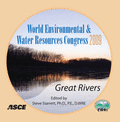Field Testing Guidelines for Certification of Manufactured Stormwater BMPs: Part II
Publication: World Environmental and Water Resources Congress 2009: Great Rivers
Abstract
Guidance from information and field testing concepts examined by the ASCE/EWRI Subcommittee on Field Testing is presented. Field-testing of manufactured treatment devices requires critical planning and implementation through all steps of the verification process from watershed/catchment selection, to testing and analytical protocols, to data evaluation and quality assurance and control measures, to data reporting guidelines. Ultimately the goal of field testing is to provide verification of analytical or numerical models for BMPs that have been developed through scaled or full-scale controlled physical model testing. The desired goals and outcomes must be known and designed into the entire verification process. Ultimately, the entire process leads to a defensible model that represents a quantitative yardstick for both deterministic and probabilistic evaluations of a BMP for stakeholders across a range of regional conditions. This committee is focused on field verification of a BMP for separation of particulate matter (PM) from rainfall-runoff and snowmelt. Towards this goal, the entire gradation of PM requires characterization for a BMP field evaluation, in particular the suspended fraction because of the mobility and acute bio-availability of this finer fraction. On the other hand, the coarse sediment fraction is of particular importance because this coarse fraction fills many BMPs and is most labile. A fundamental, transferable and defensible methodology is considered which includes particle size distributions (PSD) combined with gravimetric index tests for PM: total suspended solids (TSS) and suspended sediment concentration (SSC). TSS by definition is the PM fraction remaining suspended in an Imhoff Cone after one hour, although current methods utilize sub-sampling generate controversy as to the meaning of the measurement. However TSS remains in use because of ubiquitous usage, regulatory significance and as an important index of treatability. In contrast, SSC provides a gravimetric analysis of the entire sample and therefore limited bias, and outstanding reliability and repeatability. Quality assurance and feedback protocol are a necessary part of the testing protocol. We must recognize the range of challenges and collect sufficient representative data within an event and across events so that the role of such uniqueness can be quantified for the specific BMP or BMPs tested.
Get full access to this article
View all available purchase options and get full access to this chapter.
Information & Authors
Information
Published In
Copyright
© 2009 American Society of Civil Engineers.
History
Published online: Apr 26, 2012
ASCE Technical Topics:
- Best Management Practices (BMPs)
- Engineering fundamentals
- Engineering profession
- Environmental engineering
- Field tests
- Licensure and certification
- Methodology (by type)
- Models (by type)
- Numerical models
- Physical models
- Practice and Profession
- Professional practice
- Research methods (by type)
- River engineering
- River systems
- Stormwater management
- Tests (by type)
- Verification
- Water and water resources
- Water treatment
- Watersheds
Authors
Metrics & Citations
Metrics
Citations
Download citation
If you have the appropriate software installed, you can download article citation data to the citation manager of your choice. Simply select your manager software from the list below and click Download.
